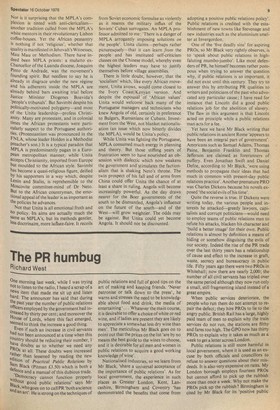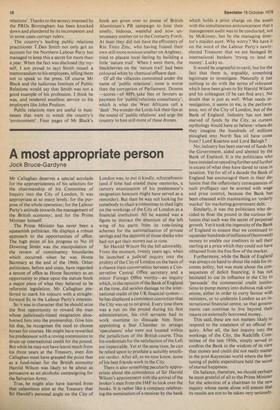The PR humbug
Richard West
One morning last week, while I was trying not to listen to the radio, I heard a scrap of a news item that made me sit up and listen hard. The announcer has said that during the Past year the number of public relations Officers employed by the government had increased by thirty percent; and moreover the House of Lords, where this fact emerged, seemed to think the increase a good thing. Even if such an increase in civil servants ilad not been announced at a time when this country should be reducing their number, I hhave doubts as to whether we need any
R at all. These doubts were increased rather than lessened by reading the new edition of Practical Public Relations by Sam Black (Pitman £3.50) which is both a defence and a manual of this dubious trade. :Democracy cannot function properly
ithout good public relations' says Mr ulack,who goes on to call PR 'both a science ahd an art'. He is strong on the techniques of
public relations and full of good tips on the art of making and keeping friends. 'Never patronise or talk down to the press', he warns and stresses the need to be knowledgable about food and drink, the media of entertaining ' . . . Whatever the main course, it is desirable to offer a choice of white or red wine, and if ladies are present they are likely to appreciate a somewhat less dry wine than men'. The meticulous Mr Black goes on to point out that the prices on the list 'are by no means the best guide to the wines to choose, and it is desirable for all men and women in public relations to acquire a good working knowledge of wine'.
Nationalised industries, so we learn from Mr Black, 'share a universal acceptance of the importance of public relations'. As for local government, the experience in such places as Greater London, Kent, Lancashire, Birmingham and Coventry 'has demonstrated the benefits that come from adopting a positive public relations policy'. Public relations is credited with the establishment of new towns like Stevenage and new industries such as the aluminium smelter at lnvergordon.
One of the 'five deadly sins' for aspiring PROs, so Mr Black very rightly observes, is to 'speak about public relations in highfaluting mumbo-jumbo'. Like most defenders of PR, he himself becomes rather pompous when trying to answer the question why, if public relations is so important, it did not exist until this century. They try to answer this by attributing PR qualities to writers and politicians of the past who advocated any particular cause; I have read for instance that Lincoln did a good public relations job for the abolition of slavery. The flaw in this argument is that Lincoln acted on principle while a public relations man acts for a fee.
Yet here we have Mr Black writing that public relations in ancient Rome 'appears to have been an integral part of government'. Americans such as Samuel Adams, Thomas Paine, Benjamin Franklin and Thomas Jefferson are claimed as forerunners of puffery. Even Jonathan Swift and Daniel Defoe, according to Mr Black, 'were using methods to propagate their ideas that had much in common with present-day public relations practice'. Another premature PRO was Charles Dickens because his novels exposed 'the social evils of his time'.
Quite the reverse is true. If Dickens were writing today, the various people and interests he attacked—greedy lawyers, capitalists and corrupt politicians—would need to employ teams of public relations men to refute his attacks, blacken his character and 'build a better image' for their own. Public relations is almost by definition a means of hiding or somehow disguising the evils of our society. Indeed the rise of the PR trade over the last thirty years has a relationship of cause and effect to the increase in graft, waste, secrecy and bureaucracy in public life. Fifty years ago there were two PROs in Whitehall; now there are nearly 2,000; the number of all civil servants has tripled over the same period although they now run only a small, still fragmenting island instead of a great empire.
When public services deteriorate, the people who run them do not attempt to repair the defect ; they hire PROs to lie to the angry public. British Rail has a large, highly paid team of men to explain why the train services do not run, the stations are filthy and fares too high. The GPO now has thirty PROs to explain why it takes as much as a week to get a letter across London. Public relations is still more harmful in local government, where it is used as an excuse by both officials and councillors to refuse to answer questions about their misdeeds. It is also very expensive on rates. My London borough employs fourteen PROs but cannot afford to pick up the rubbish more than once a week. Why not make the PROs pick up the rubbish ? Birmingham is cited by Mr Black for its 'positive public relations'. Thanks to the secrecy imposed by the PROs Birmingham has been knocked down and plundered by its incompetent and in some cases corrupt rulers.
The country's leading public relations practitioner T.Dan Smith not only got an account for the Northern Labour Party but managed to keep this a secret for more than a year. When the fact was disclosed (by myself, I am proud to say) Smith issued a memorandum to his employees, telling them not to speak to the press. Of course Mr Black and the ludicrous Institute of Public Relations would say that Smith was not a good example of his profession. [think he was, and rendered excellent service to his employers like John Poulson.
Public relations men are useful to businesses that want to wreck the country's 'environment'. Four pages of Mr Black's
book are given over to praise of British Aluminium's PR campaign to foist their smelly, hideous, wasteful and now unnecessary smelter on to the Cromarty Forth. At least they did not have the effrontery of Rio Tinto Zinc, who having foisted their own still more noxious smelter on Anglesey, tried to placate local feeling by building a little 'nature trail'. When I went there, the blackberries on the 'nature trail' had been coloured white by chemical effluent dust.
Of all the villainies committed under the name of 'public relations', none is worse than the corruption of Parliament. Dozens —scores—of MPs take fees or favours as payment for 'public relations consultancy', which is what the West Africans call a 'dash'. No wonder the Lords lick their lips at the sound of 'public relations' and urge the country to hire still more of these drones.



































 Previous page
Previous page